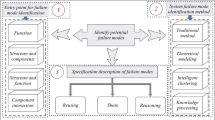Abstract
FMECA (Failure Modes, Effects and Criticality Analysis) is a procedure used to identify potential failure modes, determine causes and effects of failure modes and mitigate or remove its effects on system functional performance. For the last several decades, FMECA has been widely used in industry, and specialized versions of FMEA have been developed for several industrial sectors. For instance, MIL-1629a, SAE-J1739 and IEC-60812 have been mainly used in the military, automotive and electronics industries, respectively. However, there is no specialized FMECA method for the railroad industry yet, despite a need for highly reliable systems. Thus, in this study three specifications, MIL-1629a, SAE-J1739 and IEC-60812, were analyzed and compared with one another, and characteristics and requirements of railroad systems were summarized. Then a specialized FMECA procedure for railroad systems was proposed based on the processes documented in the specifications, characteristics and requirements of railroad systems. Finally, the procedure was applied to a railroad system in order to validate its applicability.
Similar content being viewed by others
References
IEC (2001a). Analysis Techniques for System Reliability-Procedure for Failure Mode and Effects Analysis (FMEA). IEC Standard. IEC-60812. Int. Electrotechnical Commission.
IEC (2001b). Railway Applications-Specification and Demonstration of Reliability, Availability, Maintainability and Safety (RAMS). IEC Standard. IEC-62278. Int. Electrotechnical Commission.
Kim, H. J., Bae, C. H., Kim, S. H., Lee, H. Y., Park, K. J. and Suh, M. W. (2009). Development of a knowledgebased hybrid failure diagnosis system for urban transit. Int. J. Automotive Technology 10,1, 123–129.
Kmenta, S. and Ishii, K. (2004). Scenario-based failure modes and effects analysis using expected cost. J. Mechanical Design, 126, 1027–1035.
MIL (1980). Procedures for Performing a Failure Mode, Effects and Criticality Analysis. Military Standard. MIL-1629a. US Department of Defense.
Pillay, A. and Wang, J. (2003). Modified failure mode and effects analysis using approximate reasoning. Reliability Engineering and System Safety, 79, 69–35.
Puente, J., Pino, R., Priore, P. and Fuente, D. (2002). A decision support system for applying failure mode and effects analysis. Int. J. Quality & Reliability Management, 19, 137–150.
Ramakumar, R. (1993). Engineering Reliability: Fundamentals and Applications. Prentice-Hall. New Jersey.
Rhee, S. J. and Ishii, K. (2003). Using cost based FMEA to enhance reliability and serviceability. Advanced Engineering Informatics, 17, 179–188.
RIAC (2007). Failure Mode/Mechanism Distribution-FMD97. Reliability Information Analysis Center, New York.
SAE (2000). Potential Failure Mode and Effects Analysis in Design (Design FMEA), Potential Failure Mode and Effects Analysis in Manufacturing and Assembly Processes (Process FMEA). SAE Standard. SAE -J1739. SAE.
SAE (2001). Failure Modes, Efects, and Criticality Analysis Procedures. SAE Standard. SAE-ARP5580. SAE.
Seo, S.-B. (2000). Understanding of Railroad Engineering. Eol and Al (in Korean). Seoul.
Stamatics, D. H. (2003). Failure Mode Effect Analysis: FMEA from Theory to Execution. American Society for Quality. Milwaukee.
STUK (2002). Failure Mode and Effects Analysis of Software-Based Automation Systems. STUK Standard. STUKYTO-TR 190. the Radiation and Nuclear Safety Authority Finland.
Author information
Authors and Affiliations
Corresponding author
Rights and permissions
About this article
Cite this article
Kim, J.H., Jeong, H.Y. & Park, J.S. Development of the FMECA process and analysis methodology for railroad systems. Int.J Automot. Technol. 10, 753–759 (2009). https://doi.org/10.1007/s12239-009-0088-z
Received:
Revised:
Published:
Issue Date:
DOI: https://doi.org/10.1007/s12239-009-0088-z




